Peter MALONE
Saturday, 18 September 2021 19:22
Glitter Dome, The
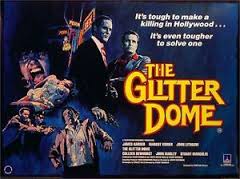
THE GLITTER DOME
US, 1984, 96 minutes, Colour.
James Garner, John Lithgow, Margot Kidder, Colleen Dewhurst, John Marley, Stuart Margolin.
Directed by Stuart Margolin.
The Glitter Dome is one of many film versions of Joseph Wambaugh's police novels: The New Centurions, The Choir Boys, The Onion Field, The Black Marble. The style of this film is home box office - for the television audience. Though it is frank and violent, the treatment is television-style smooth for the home audience.
The film is the work of Stuart Margolin, from The Rockford Files and many other films. He directed, scored the music, co-produced and wrote. His friend from The Rockford Files, James Garner, takes the central role (and many commented on the resemblance of the style to the television series). James Garner is perhaps a bit too cheerful to be persuasive as the world-weary Los Angeles detective.
John Lithgow (World According to Garp, Terms of Endearment, Blowout) has a good, if over-wrought role, as the buddy detective undergoing an emotional breakdown. Margot Kidder is a film star. Stuart Margolin himself is a camp Hollywood producer. Colleen Dewhurst has a strong guest role.
The film shows the ugly side of the American cities, especially Los Angeles with its film industry, fantasy - and exploitive side with child pornography.
Interesting, but not as telling as other versions of Wambaugh's novels.
1. Interesting thriller, police story? The squalid world of Los Angeles?
2. Production values: the atmosphere of Los Angeles (with Canadian locations)? Light and dark, night and day? The ugly world of the streets? The affluent world of Hollywood, producers, stars? The studios? The pornography world? How credible a real world? The musical score?
3. Impact for audiences? Home box office and gearing for home viewing? The film's resemblance to a police television series? The popular treatment, focus on plot development rather than characters and themes?
4. The world of Los Angeles: the ordinary world, the dark streets, the squalor? The comment that this was the same as anywhere? The differences - Los Angeles heightening this kind of squalor? Its effect on people? Effect on the audience?
5. James Garner as Al? His image from television series and films? His voice-over comment? A typical Joseph Wambaugh cop? The gaudy Glitter Dome and his drinking there, picking up girls - who want to pick up policemen? A burnt-out case, sexual impotence etc.? His skill at his work? Friendship with Martin - and support of him? The past marriages and break-up? The Chief and the briefing sessions? Cynical tone? Jobs, completion - often by accident? Being assigned to the’ murder investigation? His worry about Martin - his visits to the church, dreams? His sense of responsibility for him? Their work together? Friendship? The interviewing of the various suspects - the visit to the studio, the camp nephew of the producer, the black man who posed for the homosexuals, the film stars? The response to the world of the studio, filming? Enjoyment of the party? The encounter with helpful information? His ringing her at the end, disappointment in her, her coming to the Glitter Dome? The young girl caught up in the pornography world, the visits to her father, the tracking down of the photographer at the skating rink, the director, following the leads? Lorna and her protection of Jill? Her threat of libel action? The chasing of Lloyd Bozeman? Extracting the confession from the Chinese who spoke no English? Marty's death? The funeral? Farrell at the funeral and Al's pursuing him? The truth?
6. Martin and his work as a detective, the failure of his marriage, his trauma at this? The case of the father castrating his son - and its being a recurring nightmare? Catholic background? The emphasis on Catholicism, conscience, responsibility? His praying in the church? His contact with Elliott, the Mexican informer, the arrest and his being tricked into putting the finger on Elliott? Going to the cinema to warn him away? Elliot's death and his blaming himself? Participation in the interrogation? His awkwardness at the Hollywood party? The encounters with Lorna, Farrell? His awareness of the truth? The overwhelming effect and his driving his car over the cliff? A typical Wambaugh cop who cannot cope?
7. The picture of the police, the Chief and the reaction to him, Ferret and Weasel and their punk style, the stake-outs and chases? Their contribution to law and order in Los Angeles? An oppressive experience? The police on the beat - the comedian policeman stalking Bozeman up the steps - almost as if a comedy routine?
8. The world of the film studios, the extension to pornography? The snuff movie background? The photographer, the petty thief and film producer? The links with American studios and Sinclair? Jill and her work on the streets. propositioned. participating in the sado-masochist film? Her ordinary life with Lorna? Lorna being able to kill for Jill's protection? Her father actually killing for her?
9. The sketch of Lorna. care for Jill, relationships, information - and threat to the police?
10. The interview with Farrell, his appearing at the funeral. confrontation with Al, the truth?
11. The ugly American cities? Values? Loss of values? The law and order-keepers - and where do they get their help?
Published in Movie Reviews
Published in
Movie Reviews
Tagged under
Saturday, 18 September 2021 19:22
Glenn Miller Story, The
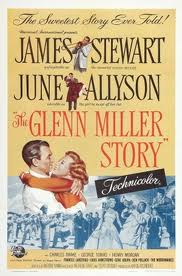
THE GLENN MILLER STORY
US, 1954, 116 minutes, Colour.
James Stewart, June Allyson, Harry Morgan, Charles Drake, Frances Langford, Louis Armstrong, Gene Krupa.
Directed by Anthony Mann.
The Glenn Miller Story is an enjoyable biopic of the '50s. It has the usual glowing treatment and tribute. James Stewart and June Allyson had acted in a tribute to baseball player Monty Stratton and were to be teamed, by the same director Anthony Mann, in Strategic Air Command.
Glenn Miller had a great reputation for his band, compositions and arrangements and for his contribution to morale in the war effort. As with Carole Lombard and Leslie Howard and others, he disappeared in a plane accident during the war. His music has lasted through the decades and is still popular.
James Stewart gives yet another variation of his sturdy and upright characters with the touch of whimsy. June Allyson was a popular heroine of the early '50s. The screenplay is straightforward, the music attractive and it comes together as a satisfying if romanticised biography. James Stewart was to make eight films with Anthony Mann during the '50s, mostly westerns including Winchester 73 and The Man From Laramie.
1. Audience enjoyment of the popular biographical film? The '50s style of this biography? The perennial interest in celebrities' lives, struggles, love stories, achievement - and the touch of tragedy?
2. Colour photography, the re-creation of the period? The importance of Glenn Miller's music, the arrangements, the incorporation of his popular pieces throughout the film? The use of so many guest stars including Ben Pollock, Gene Krupa, Louis Armstrong, Frances Langford? Glenn miller and his reputation: as a person, his talent, his musical arrangements, the role of the big band in the '30s and during the war, with the armed forces? The lasting value of his music?
3. James Stewart and his presence and reputation to embody Miller? The popularity of June Allyson? The blend of realism
/romanticism/idealism? The sketch of Glenn miller throughout the film: his drive, pawning his instruments, seeking work, moderate success, his love for Helen and yet not contacting her for two years, his sudden visits in the middle of the night and his charming Helen, his urging her to New York and to sudden marriage, his dreams of finding his own sound, Helen's supporting him -the joy of the wedding, the performance of Girl Crazy, the party and Louis Armstrong? Her disappointment in his not finding his own sound, his needing Helen, her shrewd and practical finding of money, managing their tours? The establishment of the band? His study and composition - especially Moonlight Serenade (and the humour of the stepped-up version of it)? The hard conditions for travelling bands, accidents, failure? His response to Helen's inability to have children? The adoptions? Sy and the possibility of a new band? The practices and the discovery of his sound? The applause? The collage of his success over many years? The sentiment in the anniversary dinner?
4. The war and his commission, the army, his changing the music for the parades? His contribution to morale in the war effort? The pathos of his death - but his lasting music and the joyful sentiment with the final rendition of Little Brown Jug?
5. Helen and her vitality, her waiting for long periods till he came, her going to New York, the zest of the wedding, the performance, the party? Her stating her disappointment and urging him to greater things? Her practical management of the group? The adoption of the children? Their genuine love for each other - and her grief at his death? at the end with the message from his music? Yet her smile?
6. The sketch of his companions - Chummy, Don, Sy and his support? The sketch of the parents? The army personnel?
7. The American Dream, hardship, struggle, poverty, walking the streets, opportunities, fulfilment and success - all done with a nice touch?
8. Glenn Miller and his particular sound? The big bands? Their popularity? Their lasting value?
9. An enjoyable piece of romantic Americana?
Published in Movie Reviews
Published in
Movie Reviews
Tagged under
Saturday, 18 September 2021 19:22
Glass Wall, The
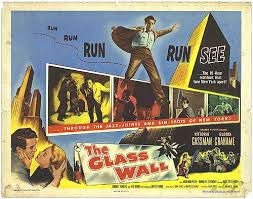
THE GLASS WALL
US, 1953, 79 minutes, Black and white.
Vittorio Gassman, Gloria Grahame.
Directed by Maxwell Shane.
The Glass Wall is a brief B-budget Columbia thriller of the early '50s. Written and directed by Maxwell Shane, a director of many similar films who later worked in television. Vittorio Gassman was making an international name for himself in the early 1950s. He has been a screen presence, especially in Italian films of the '60s and '70s, but has appeared in many international films including Sharky's machine, Quintet, A Wedding. Gloria Grahame won an Oscar for Best Supporting Actress in 1952 for The Bad and the Beautiful. The clarinet player is played by Jerry Paris, who later made a successful career as a director of comedies for cinema and television. The theme of migrants and their rights has been relevant in the decades after World War Two. The film is melodramatic but
makes its point quite effectively.
1. The impact of the film as drama, human document? Its message about migrants and their rights? The American setting - and the jolt to the American conscience?
2. Production values: B-budget, cast. New York settings, black and white photography, score? Effectiveness of the film in its length?
3. The post-World War Two migrant situation? European migrants and the experience of the war, concentration camps? Helping American soldiers? Legal procedures, stowaways? America as the traditional land of opportunity for European migrants? Questions of law and justice? Their effect on the individuals? Moral obligation for the United States?
4. The character sketch of Peter: his stowing away, being caught, his pleading to the officials, their scepticism about his story in helping Tom, his dilemma? His escape and his ingenious means of getting away? Wandering the New York streets? Searching for Tom, Times Square? The background of his experience during the war and audience sympathy for him? The encounter with the girl, her stealing the coat? Returning to her flat, his illness and wound, helping her with the money, the landlady and her boorish son, his clashing with him? Police reports? Walking the streets? The dangers? His wandering into places - the burlesque house, sitting in the taxi, his experience of the Hungarians and leaving? Wandering to the United Nations building? His hope in the united Nations? The chase? His contemplation of suicide? An effective characterisation?
5. The heroine - her story, factory work, moving to New York, stealing the coat, money for the rent, the advances of the landlady's son? Her helping Peter? Walking with him? Helping the police to find him? Persuading him to live?
6. Tommy and the war story, clarinet-playing, his girlfriend and her push, his discovery about Peter, finding the paper and listening to the man in the washroom, playing but wanting to go and help, discussions with the officials, helping in the chase?
7. The sketch of the officials and their administration of the law, some sceptical, some sympathetic? Contact with the police? Helping to save Peter?
8. The girl from the burlesque, the Hungarian background, her sympathetic mother, the young man of the family and his mother slapping him? The point about the self-centredness of previous migrants?
9. The landlady and her boorish son? The selfishness of Tommy's girlfriend? The film's comment on people's uncaring attitudes?
10. The style of the chase melodrama and its effectiveness for this kind of human emotional drama about moral issues and principles?
Published in Movie Reviews
Published in
Movie Reviews
Tagged under
Saturday, 18 September 2021 19:22
Glass Slipper, The
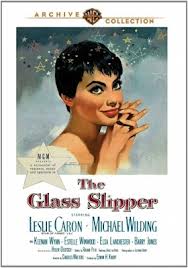
THE GLASS SLIPPER
US, 1954, 94 minutes, Colour.
Leslie Caron, Michael Wilding, Keenan Wynn, Estelle Winwood, Elsa Lanchester, Barry Jones.
Directed by Charles Walters.
The Glass Slipper is a musical version of the Cinderella story. The Cinderella Story was presented in a Disney animated form in the fifties, and in a full scale musical version in the seventies in The Slipper and the Rose. This musical film depends for its charm on the presence of Leslie Caron as Cinderella. There are ballet sequences for which this actress was noted in the fifties. Michael Wilding is the Prince Charming. It is a very pleasant re-working of the old story, slight but lightly presented. It is enjoyable for all.
1. What was the constant appeal of the fairy tale? The story ingredients? The characters? The themes? The truth about human nature and the world communicated through such basic stories?
2. The appeal and the charm about this film: colour. sets and settings, costumes music. dancing and song?
3. The humour and the irony of the commentary? The purpose in the narration, the characterisation, the pointing to the moral?
4. How satisfying was the treatment of the Cinderella story? The realism of setting, characters and motivation? The final touches of magic, of the pumpkin and the fairy god-mother disappearing?
5. How attractive was Mrs. Toquet as the fairy godmother? The comedy in her eccentricity? Her friendliness. stealing things? Her enjoying the sounds of words? Her proverbs? Her friendliness and comforting of Cinderella? The effect on Cinderella?
6. How attractive was Leslie Caron as Cinderella? A credible Cinderella, dirty and difficult, boyish looking and laughed at, imposed on by the stepmother and sisters? Cinderella as a victim of the town and her family? The story of her mother's death?
7. Audience response to the prince? Was he a prince charming? His background,, upbringing.. status in the village. education and reputation? The response of the village. the fuss of the stepmother and the sisters? Ella's disappointment in not seeing him?
8. The importance of the prince going for his walk to the secret place? The story of his memory of the girl and her eyes? The importance of the encounter and Ella's becoming a friend of the prince? His disguise. his teaching her how to dance? The blossoming of love? Her fear?
9. The contribution of the ballet and the song sequences? The theme music? The prince singing it? Learning to dance to the melody? The ballet and the fantasies, the sitting on the throne, the ballet of the pastry cook, the final ballet of the Egyptian princess and the lament? Their style, atmosphere?
1O. The atmosphere of the town: gossip, dressing for the ball, the pretentious attitudes? The character of the step mother and the sisters? Their vanity and the commentator's comment? Cousin Lulu?
11. Ella's happiness at the invitation to the ball? Her regrets at not being able to go, fantasies? The humour of Mrs Toquet and the dress, the carriage?
12. The preparations, her arrival? The impression she made at the ball? Happiness for herself, revelation of the truth, the king's response, the atmosphere of the sisters and the townspeople gossipping?
13. The sadness for Ella as regards the gossip and its effect? Hurt, her fantasies, the ballet of the Egyptian princess?
14. How necessary was the happy ending? How satisfying?
15. The values about human nature, rich and poor, truth, love and dislike?
Published in Movie Reviews
Published in
Movie Reviews
Tagged under
Saturday, 18 September 2021 19:22
Glass Key, The

THE GLASS KEY
US, 1942, 85 minutes, Black and White.
Brian Donlevy, Veronica Lake, Alan Ladd, Richard Denning, Bonita Granville, Frances Gifford, William Bendix. Directed by Stuart Heisler.
The Glass Key has the look of the 40's, fast, tough, crisp black and white photography, a mixture of romance, romantic poses and strong U.S. images. The film, based on a Dashiell Hammett story, is about politics and gangsters in the old American tradition. This kind of story is always interesting and raises discussion, especially about differences from and similarities to present situations.
The film is one of Alan Ladd's earliest films and he comes across fairly well. Veronica Lake's poses and articulation do not stand the test of time so well. Of more than passing interest.
1. Did this film seem dated? Why?
2. Despite the styles of the 40's, did the film retain audience interest? Why?
3. What was the significance of the title? How was its meaning illustrated in the film?
4. Were your sympathies for or against Paul Madvig and Ed Beaumont at the beginning of the film? Did they change during the film? Where were your sympathies at the end? Why?
5. Was the film a murder mystery or a political thriller?
6. What traits make the film a film of its time? E.g., tough style, crisp sequences and clipped acting and speech by the men and languid or sorrowful postures by the women. Do these jar now?
7. What kind of man was Paul Madvig - a good politician? was he a dirty politician, amoral? Did he have many brains? Was he shrewd or not? Why did he value Ed's friendship and follow his advice?
8. What did you think of the various behind-the-scenes machinations for political victory? Do you like this sort of behaviour and manoeuvring? Why?
9. What kind of man was Ed Beaumont? Did you like him? Was he a tough poser? Why was he so loyal to Paul? Did he believe in Paul? (Did you think they had broken their friendship when they fought in the bar?) Why did he fall in love with Janet? Why did he put Paul's case before his love for Janet?
10. Did you like Janet? Did you like Veronica Lake's style - hair, fashions eye-acting, voice? why? Was she a convincing character? was she a snob? Why did she despise Paul? What attracted her to Ed? Why did she send the anonymous notes? Did you think her guilty of murder at any time? Why?
11. What impression of politics did you get from the sub-plots about night clubs 'protection', bashings, the use of newspapers for political ends, blackmail, suicides? Did this seem real to you in the film? Why?
12. Was the revelation of what happened convincing? Was the happy ending well done? Why? How could it have been improved?
Published in Movie Reviews
Published in
Movie Reviews
Tagged under
Saturday, 18 September 2021 19:22
Glass House, The
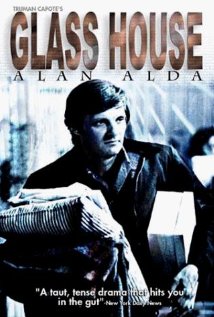
THE GLASS HOUSE
US, 1972, 91 minutes, Colour.
Vic Morrow, Alan Alda, Clu Gulager, Billy Dee Williams, Kristoffer Tabori.
Directed by Tom Gries.
Any serious film about prisons should be a deterrent. The cutting off of men, convicted of crimes from murder and robbery to manslaughter and petty thieving, and putting them together for months and years with all the inevitable problems of isolation, personality clashes, dominance, corruption, is a frightening thing. This film portrays all this, as well as showing the frustration of working within a limited system, with the good being lost or crushed in the process. As a glimpse of prison, this sombre, but not too sensationalised, film could well be recommended. It could not leave its audiences neutral.
1. The irony of the name for a film about prisons? Was this a satisfactory film about prisons? What were your basic emotional responses to the story and its treatment? Why?
2. Why are films about prisons emotional for audiences? How do audiences respond to the feeling of prisons and the nature of imprisonment and loss of freedom? Why are prisons such dangerous places? Criminals without reform being cooped up together? The possibility of corruption and the abuse of power within prisons? Prisoners amongst themselves, guards and prisoners? Prisons as a symbol of the society which makes them? The status quo and the impossibility of change etc.? Could this film have a healthy effect on audiences who see it, as regards prison reform? Why?
3. The importance of the initial sequences and the credits - with the snow, the white and the blue and the clarity of the air and freedom? The structure of the film as a journey in and out of the prison? The audience going in, experiencing the prison and then going out, changed? How effective was this?
4. How was audience sympathy engaged for the conflicts in the film? Identification with Jonathan Paige and his seeming innocence and uprightness? Also entering the prison with Courtland and his aims of doing a good job? The usefulness of the flashbacks to explain Paige and the nature of his manslaughter? Audience sympathy in realizing that he was not entirely to blame for malice?
5. How well did the film show the mixing of all the prisoners? The details of life in the prison, the cells, the meals, recreation, work, the cliques that formed and the structures of power within the prison? What is your emotional response to this kind of life?
6. What did the film have to say about the wardens? By focussing attention on Courtland with his Vietnam background. his choosing of a career his wanting to do the right thing. his reaction to abuses? How helpless did the audience feel with Courtland?
7. How was this brought to a head by the presentation of the governor? The fact that he was old, running the system for many years, knowing the abuses possible and trying to gloss them over? His reaction at the end in glossing over all the problems? Maintaining the status quo because it was the best available? What was your response to the governor? What should he have done?
8. What did the film have to say about the system and its inadequacies? What should be done for prison reform? What lines did the film indicate?
9. How was Brown and his abuses and links with the prisoners a symbol of the corruption of the wardens? Do you think this was typical or was Brown an exception?
10. What was your response to Slocum and h-is hold over the prisoners? His ability to put pressures on people? The fact that he was followed around by Ajax and other companions? That he thought he was king? His expectations of how he ran things? The meals, his arranging of jobs, his getting drugs, his hold on people like Sinclair? How repulsive was he? Was it inevitable that he and Paige should clash? Why did Paige not bow to him?
11. How sympathetic was the audience to Alan Campbell? The nature of his offence? The fact that he was put in such a prison? The fact that he was young and inexperienced? Believing Slocum? Not realizing the advice that Paige gave him?
12. How well was this portrayed in the inter-relationships of these men - Alan and his getting the guitar and Slocum's hold over him for homosexual purposes, the revenge by mass rape with the ugly men in the laundry, the inevitability of Alan's suicide and the impact of this on the audience? Paige's work in the pharmacy and his refusal to supply the drugs to Ajax and Slocum's men, and the inevitable scuffles between them? The inter-relationship of Paige and Lennox with his black ideals of a big revolution and changing the whole system? Sinclair and his fear of Slocum, his response to Paige, especially about his children's book, and the audience response to Slocum's tearing up his book and the murder of Sinclair?
13. What choices did Paige have as regards prison reform and challenging Slocum? How was this emphasised by the sequence where his wife visited him in prison? Trying to do something or living out the year so that he would be free? Did he make the right choices? Was his death in vain?
14. What did the film have to say about justice and guilt? The irony of the final climax, Slocum being shot, Lennox standing back but giving Paige the gun. Courtland's shooting of Paige? The discussion between Courtland and the governor?
15. Was this an ordinary kind of film treating an important subject, or did it do it very well?
Published in Movie Reviews
Published in
Movie Reviews
Tagged under
Saturday, 18 September 2021 19:22
Glass Cell, The
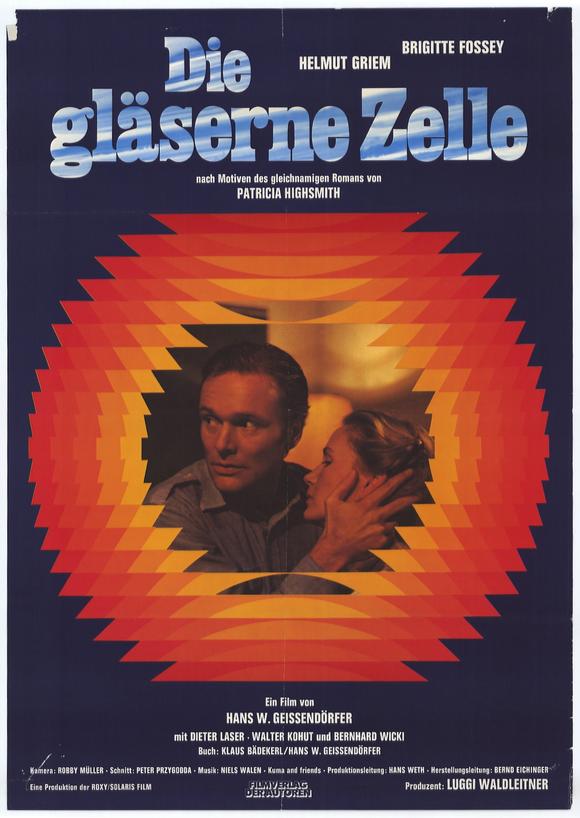
THE GLASS CELL
Germany, 1978, 101 minutes, Colour.
Helmut Griem, Brigitte Fossey, Bernhard Wickhi.
Directed by Hans W. Geissendoefer.
The Glass Cell is a German psychological thriller. It was a nomination for the Oscar for Best Foreign Film in 1978. It is based on a novel by Patricia Highsmith - whose novel The American Friend was made by avant-garde director Wim Wenders with Denis Hopper in the lead. The film portrays crime but it also shows the dilemmas for those put into circumstances which bring out their criminal activity. The identification of the audience with the hero is very strong, even in his rage and jealousy, even to murder. Helmut Griem is very effective in the central role. He has appeared in such American productions as Cabaret and The Voyage of the Damned. His wife is portrayed by French actress Brigitte Fossey. The film is reminiscent of the psychological crime melodramas written and directed by Claude Chabrol.
1. How entertaining the film as a thriller.. as a psychological drama? Its role as a fable about human nature, responsibility and guilt?
2. The thriller origins of the film? How well were these kept in terms of crime, investigation, blackmail, murder and cover-up? The psychological study of victims, mistaken identities, crimes of passion, guilt, transference of responsibility? The invitation to the audience to identify with the hero and share his experience of jealousy, rage, murder, concealment?
3. The significance of the title - the opening in prison and the overtones of people in cells? The later comments about the world being a glass cell and men being imprisoned by rules and regulations? The symbolic significance of the title for the film's action?
4. The impact of the German setting, the portrayal of Frankfurt as a modern city, the look and sounds of city life? The universal audience identifying with this setting?
5. The film's establishing Philip during the credits and the opening sequences: the cell and his anguish, the court case and the various personalities in the melodrama, the establishing of his innocence or guilt, the importance of highlighting Lasky? The build-up to Philip's release? Audience expectations of his remaking his life?
6. The transference to Lisa and Timmy? The mother and son relationship, the mention of Uncle David and the indications of tensions? The rush to meet Philip at the station? The welcome home, the tour of the new apartment? The hesitation? Philip and his trying to get used to his freedom? The awkwardness of the encounter with his wife, son? The gradual being at home, the intimacy of the bedroom sequence? The possibility of building up their life and marriage?
7. The contrast with Philip before his imprisonment and after? A growing hesitancy, the effect of five years imprisonment - especially in innocence? The audience seeing him more and more as victim? Identification and sympathy? His fears? The importance of the technique of his voice-over and the letters? His awareness of Lisa and remembering her visits? Tim and his growth, his music? David and his role as lawyer, his inability to get Philip freed during the five years? The possibility of suspicions? Suspicion festering? The encounter with Lasky and his saying that he ignored the innuendo, his following it up? David and his getting him the job? The satisfaction of the work after the interview? The continued interviews with Lasky and the evidence of the tape? Philip and his work and tension, suspicions of Lisa? The party and his breaking? Lisa's confession and his believing it, the further suspicion? Lasky's continuing influence? His feeling hurt, his inability to cope? The encounter with Lasky, the discussion with David, the irony of the breaking of the artwork by Lisa, Philip's breaking out and the brutal bashing, the irony of the incident being taped? The consequences for Lasky?
8. How well did the audience identify with Philip in his feeling, suspicions, the murdering of David?
9. The film's cumulative effect of detail - Phillip walking the city before getting his job, Lisa at the shop, his meeting with Lisa, their talks, the concert? Philip's hopes and their being dashed?
10. How well delineated was David - as character, as type? His friendship with the family, the truth about the liaison? Tim's attachment to David? David telling the truth about Lasky? The accidental encounters, the party and Philip's reaction, the telling of the truth after the meal? The visit to David and his becoming victim, both of Lasky and of Phillip?
11. How well drawn was the character of Lisa - as wife, her role in the court case, her support of her husband during the imprisonment, her ordinariness, her work? The party? The accidental differences, her not realising she was under suspicion? The tension and her quarrelling? The reaction to David's death? Her suspicions of Philip? His being arrested, his telling her to lie? Her presence in the prison and accepting him back?
12. The sketch of Timmy, Philip and Lisa in relationship to him? His music, the concert, David's presence? His own composition and playing it for his mother and father? His reaction to David's death? Philip's attempts at establishing himself as father?
13. Lasky and his presence in the court, his criminal ventures, an ugly character? The meetings, suspicions, the tape? The blackmailing of Philip? The encounters and clashes? The set-up to his death? The irony of his being murdered by Philip and his sureness especially after the line-ups?
14. Philip and the build-up to his desperation? His calm reaction to the killing of David, covering up the clues? The encounter with Lasky? Establishing alibis? The irony of the violent outbreak and his subsequent calm?
15. The line-ups and the attitude of the police inspector, his suspicions of Philip? The interrogations?
16. Philip and his building of the future - h-is denial to Timmy, Lisa and his asking her to lie? Her acceptance of him at the end? Did she know the truth? Did she accept his guilt?
17. The irony of his initial innocence, his being victimised by Lasky, Lasky providing occasions for the breaking up of several innocent lives? How important were the themes of guilt, responsibility, justice? The evil in the web of circumstances and human beings becoming victim?
Published in Movie Reviews
Published in
Movie Reviews
Tagged under
Saturday, 18 September 2021 19:22
Give My Regards to Broad Street
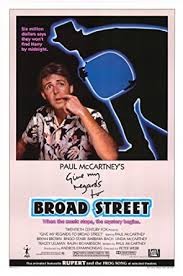
GIVE MY REGARDS TO BROAD STREET
UK, 1984, 103 minutes, Colour.
Paul Mc Cartney, Bryan Brown, Ringo Starr, Barbara Bach, Linda Mc Cartney, Tracey Ullman, Ralph Richardson, George Martin.
Directed by Peter Webb.
Give My Regards to Broad Street is a star vehicle for Paul Mc Cartney. He wrote the script (which some reviewers referred to as 'therapeutic scriptwriting'). His music (both as a Beatle and later as part of Wings) pervades the film. Most of the old Beatle favourites are presented. Many of his modern songs have dramatic presentation (in the style of television specials).
The film is an old-fashioned British fantasy - a bit along the lines of A Hard Day's Night and Help. However, the young verve of the 1960s Beatles is missing from this film. The director is Peter Webb, a director from television commercials. He uses the vigorous and colourful commercial style - but with less range than Richard Lester did with the films of the '60s. The film has an interesting cast including Bryan Brown as Paul's Australian manager, Ringo Starr and his wife Barbara Bach have guest roles. Linda Mc Cartney appears in the musical segments. Ralph Richardson, in one of his final roles, is an old man in a tenement who offers Paul wise advice.
The film is slight, both old-fashioned and offbeat - and did not receive the acclaim that Paul Mc Cartney hoped for.
1. An entertaining film? A Paul Mc Cartney vehicle? The memories of the Beatles? Appreciation for Paul Mc Cartney's music? A film of the '80s - of a middle-aged man?
2. The focus on Paul Mc Cartney: the story, the scriptwriting, the music? McCartney's persona - past and present? Performance, singing, work with his wife Linda? An enjoyable Mc Cartney vehicle - or can the film be seen as something of an ego trip?
3. The importance of the music, its pervading the film? The range of songs, styles of performance, dramatising, choreography and decor? The blend of rock and roll and sweet music?
4. The old-fashioned plot: the reverie with its blend of reality and unreality? The life of a pop star, a celebrity? Agents, recording studios, sessions, television specials, radio interviews? Deadlines? The background of ex-convicts and crises? Dreams?
5. The visual styles - the influence of television commercials, television specials? Reality, dreams and nightmare? Rock music, punk, glitter? TV commercials and editing, pace, real and surreal?
6. The character of Paul as star as former Beatle, as composer, singer, celebrity? The importance of the radio interview and the interviewer's reaction, questions, Paul response, reflection on the meaning of his life, career, performance, impact? Middle age and pressure? Paul as a likable character?
7. Steve as the suave Australian agent? Supportive of Paul, anxious, pushy, handling situations? Friendship? His place in the fantasies - e.g. the Victorian picnic? Handling the crisis? Bryan Brown's presence and style?
8. Ringo Starr and Barbara Bach as guest stars? Their contribution - a bit like a home movie? Ringo as drummer? Barbara as journalist?
9. Harry and the ex-convict, Paul's consideration for him, employment, the suspicious flashbacks, Harry's suspicious behaviour. contacts, the master record, trustworthy or not? Harry and Sandra? Her punk style? Big Bob? The imagination and
reality? Harry at the railway station, being locked in the toilet, the deadpan irony of the finale?
10. The visit to Jim, Ralph Richardson and his style, age, friendship, advice?
11. The background of the recording industry: tapes, masters, problems of piracy. industry takeovers. board meetings, industrial espionage? The personalities of the record industry?
12. The personalities of the media workers - directors, interviewers. stagehands, choreographers?
13. Paul waking up - 'therapeutic' screenwriting? Dreams, fears, the celebrity in mid-life crisis?
Published in Movie Reviews
Published in
Movie Reviews
Tagged under
Saturday, 18 September 2021 19:22
Girl with the Red Hair, The
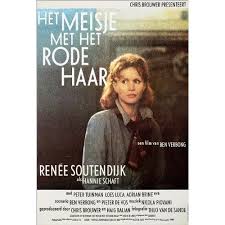
THE GIRL WITH THE RED HAIR
Holland, 1981, 113 minutes, Colour.
Rene Soutendijk, Peter Tuinman.
Directed by Ben Verbong.
The Girl With the Red Hair is the first cinema feature of Dutch director Ben Verbong. It is a story of the Dutch Resistance during World War Two, focusing, not on the warfare and large bloodshed of the war, but rather on individual killings by members of the Resistance. The heroine is a university student who joins the Resistance, is not immediately successful with her work but who, through an attachment to one of the leaders, becomes more expert, even
though she is the occasion for his death. This intensifies her attitude as the war is ending and there are attempts for scaling down Resistance operations.
The film is a memento of the Resistance fighters, their reaction against violence by violence. The film shows the growing obsession of some of the Resistance people. There is an excellent and striking performance by Renee Soutendijk in the central role. The film is moody, its colour techniques are adapted for a bleached impact of the war, the colourlessness and drabness of the time.
1. The Dutch picture of World War Two? The war in Europe? Violence, battles? The Resistance? National feeling and patriotism? The moral issues of violence and violent means used by the Resistance?
2. The film as an example of the Dutch film industry of the '80s? The debut of the director? Serious tones and attitudes? Dramatic presentation of the war and characters? A reflection on the meaning of war and its effects on people's lives and values? A memento of and tribute to the Resistance fighters? The use of locations, re-creation of period? The occupation, the fighting of the Resistance? Colour photography and its bleached tones and atmosphere? The movement and yet the frequent use of tableau to give a solemn effect to the film , Musical score and orchestrations? The technical impact of the film?
3. The framework of the film and audience knowing of Hannie's disappearance? The suspense about how she was to be arrested, sympathy for her? Changing attitudes throughout the film? The still at the opening and the final information given before the credits? Hannie wondering how she would be remembered?
4. The introduction to Hannie: an attractive Dutch girl, her study background, family? Discussions with the professor and her giving up her studies? Her wanting to join the Resistance - motivations? How clear were they? Had she thought out her position? Her feeling her position? Patriotism? Her joining the group, being tested, the test with shooting Hugo and her failing it?
5. Her values - belief in the Resistance, the political Left, rebelling against her family and background? Her friendship with Anne and her work in the Resistance? The impersonal nature of relationships? The antagonism with Hugo - and its being the beginning of attraction?
6. Hugo and his position, training Hannie? His detachment and then emotional attachment to Hannie? Their working as a team? Training on bicycles, the guns? Stalking the man on the train who was arousing propaganda against the Nazis and then betraying passengers? Following him under the bridge and killing him? The informer and her home, her child, the shooting at the steps? The officer in the restaurant and his being shot in the street? Hannie’s initial revulsion and amazement at her lack of emotion? Her putting on makeup after the killings, crying - and then crying less? Hesitations? Her not killing the woman informer? Her being responsible for Hugo's death? Her waiting for him in the restaurant? Her anguish at his death?
7. Hugo and the risks, his dedication to Resistance killings? His not being influenced by hostages killed in reprisal? His following Hannie on the bicycle and killing the German officer? His being wounded, moving through the streets, the operation, the information about the photo - and audiences discovering the Gestapo officer? Hannie's being responsible for his death? His responsibility for hers?
8. The change in Hannie after Hugo's death? The softer attitude previously in her visit to her parents, the newspaper with the information about the reprisals? Her wanting to give herself up - but then having her hair dyed, the glasses, going to meetings and taking stronger positions? Her not co-operating with the Dutch authorities at the end of the war?
9. Her being transformed, getting the information about the Gestapo officer, shadowing him at his house and his playing with the dog, her killing the dog, waiting for him to return, shooting him? The irony of her arrest did she want to be arrested? The woman in-former not identifying her? The interrogation and the discovery of the false glasses? The washing of her hair? The list of her crimes? The imprisonment and her screaming?
10. The loneliness of her execution on the sand hills? The final information talking about her being murdered? The impersonal burial in the sand?
11. The characters of the Resistance fighters: Hugo and his intensity, Floor and his being a messenger, trying to warn Hannie? Anne and her strength, her helpers, her memory of Hannie?
12. The picture of Dutch collaborators and their methods?
13. The Nazis and the Occupation, the soldiers, officers, interrogations, the Gestapo doctor? The picture of war and audience response to World War Two?
14. Themes of patriotism and nationalism? occupation and resistance? Terrorism? Violent means - are they ever justified for goals of peace?
Published in Movie Reviews
Published in
Movie Reviews
Tagged under
Saturday, 18 September 2021 19:22
Girl With Green Eyes, The
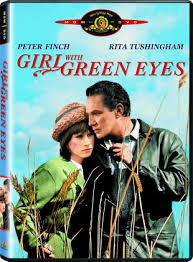
THE GIRL WITH GREEN EYES
UK, 1963, 91 minutes, Black and white.
Peter Finch, Rita Tushingham, Lynn Redgrave.
Directed by Desmond Davis.
The Girl With Green Eyes was written for the screen by novelist Edna O'Brien from her novel 'The Lonely Girl'. It focuses on Kate Brady, a girl from the country and from a convent school who, in Dublin, becomes infatuated with an older man. Rita Tushingham, early in her career, is most effective as Kate. Peter Finch gives a sympathetic performance as Eugene. In the supporting cast is a very young Lynn Redgrave as Kate's girlfriend Baba. The film focuses on a young sheltered girl, romantic ideals, reality. It is put in the setting of the '50s and '60s.
In the '80s, there was a remake of much of this material and the inclusion of a great deal of Edna O'Brien's 'The Country Girls' tracing the story of the two girls in their school. It was released as The Country Girls - with Sam Neill in the Peter Finch role.
Both films are worth seeing as dramatisations of Edna O'Brien's perceptions of Ireland. Direction of both was by Desmond Davis.
1. An enjoyable and interesting film? Portrait of a young girl?
2. Black and white photography, Ireland in the '60s, the use of Dublin locations, the countryside? The musical score and its plaintive tones?
3. The title and the focus on Kate? Audience sympathy towards her? Rita Tushingham performance? The credibility of the story - conventional yet presented with freshness?
4. The portrait of Kate Brady: Rita Tushingham's waif-like presence, her growing sophistication in the affair? Her background, family, convent school? Her Catholicism - and her belief in God, going to Mass, forgiveness? Her boarding with Baba, their getting ready to go out with the boys? The chance encounter with Eugene? her immediate infatuation? In the flat, at work - the ordinariness of her life? The letter to Eugene? His coming to see her, tea together? The growing number of meetings? Falling in love? Her going to his home? The beginning of the affair? Her choice? His role - seductive or not? The importance of the relationship? Her enjoyment of his company? Tensions - in the house, his going for a walk, her going to Mass? The arrival of her father and family? Their pressure? her going back home? The severe tones of the parish priest? The contrast she made between her behaviour and their drinking and the men being let off because they needed a drink? Her running away? Her going back to Eugene? The tension between the two? The background to her decision, her presuming him free, the discovery of his wife, his being a divorced? The discovery that he had a daughter? A married man In Ireland of the '60s? The possibility of a divorce? The possibility of her marrying him? The friendship of Baba and her support? The build-up to the living with him? The visit of Malachi and his wife and her feeling out of place? The arrival of her father and his family, Josie taking the gun to them? Her decision to move away, going to England? The importance of the aftermath - and her voice-over comment about the effect of the experience on her, her going to work, her meeting other boys? A rounded presentation of a character from real life?
5. Peter Finch's style and presence as Eugene? The initial encounter with Kate? The dog? His not taking much notice of her? Baba and her pushing herself forward? Kate's letter and his coming, the discussion about books, having tea? The growing number of meetings -the lyrical presentation of their falling in love, outings, walks, talking together? At home, Josie? The beginning of the affair? The impact on Kate? On himself? Her reaction and running away at the news of his wife? His making a move, telephoning, explaining the situation to her? The living together? His taking her to Mass and the discussion about God and his not being able to understand her religious devotion? The impact of her father and the family arriving, their intruding into the house, Kate under the bed, Josie firing the shot? The friendship with Malachi and the discussion about common Interests, Kate being left out? The break? Its effect? Baba going to talk with him - and his thinking it better that the affair end?
6. Baba and her sharing the experience of growing up with Kate, coming to the city, sharing the flat, working? Socialising? her chatter? Pushiness with people, talking to Eugene? Support of Kate in her troubles?
7. The sketch of Irish men, their religious standards, moral standards? Their taking the law into their own hands in getting Kate back home, drinking on the train, laying down the law to her? The parish priest and the religious and moral stance? Their intruding into the house?
8. Josie and her serving Eugene, approval or disapproval of the relationship? Handling the tense situation?
9. Malachi and his friendship? Sardonic, in contact with Eugene's wife? The visit with his wife, their excluding Kate?
10. A portrait of Ireland in the '60s, social background, relationships, morality, Catholicism, and strict standards? Breaking these? Adultery, divorce? An exploration of problems and questions of relationships in this context?
Published in Movie Reviews
Published in
Movie Reviews
Tagged under